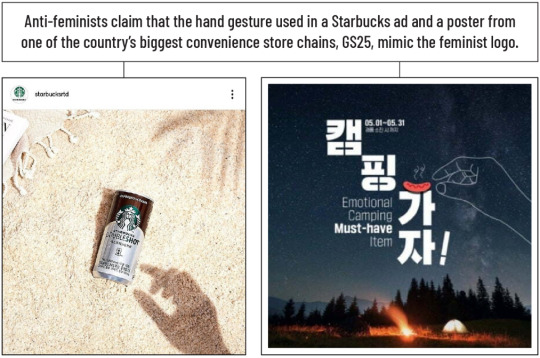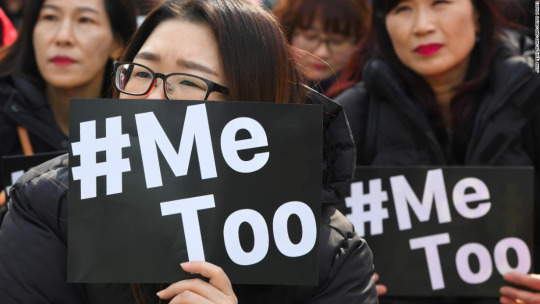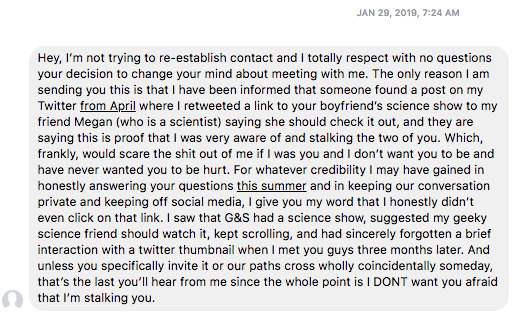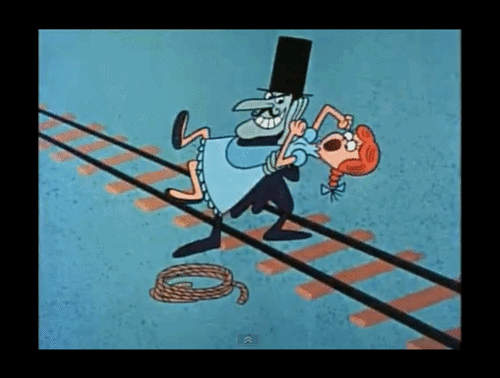#it's like they want us to continue to have to trawl the edges of media to feel validated bc in some way they still see us as inferior
Explore tagged Tumblr posts
Text
there's a thing that happens, when a same-sex relationship (especially if it's an f/f relationship/ involves a female character who has only been involved with men before) is introduced into mainstream media, where a certain type of straight person will go to facebook or similar and complain about it, and then other straight people will join in, and say things like "but apparently our opinions don't matter because we're heterosexual" and i just. FUCKING HATE IT.
we are not saying your opinions don't matter!! we are saying you're wrong, and you're being offensive, and now you have the audacity to mock us for calling you out!!
straight people can find validation and representation in nearly all media that have ever existed, and some of them are still not fucking satisfied.
#yes this is about carla and lisa#it's also about bernie and serena#bc people did exactly the same thing to serena that they're now doing to carla#(i. e.: “but she's straight!! she's never said she she was into women before!! how dare you accuse me of being homophobic”)#literally SHUT THE FUCK UP#it's like they want us to continue to have to trawl the edges of media to feel validated bc in some way they still see us as inferior#bc we don't conform to “normality”#like “yeah fine have gay representation just keep it out of my soaps. not in my backyard”#“straight people are the majority and therefore more deserving”#i might delete this later i'm just upset
12 notes
·
View notes
Link
Why a hand gesture has South Korean companies on edge 👌
It took three years for players to notice the "offensive" hand gesture lurking in one of South Korea's most popular multiplayer games.
When players made their avatars laugh, talk or give the "OK" sign in "Lost Ark," they clicked an icon featuring a gesture that might have appeared benign to many: an index finger nearly touching a thumb.
But some of "Lost Ark's" users began claiming in August that the gesture was a sexist insult against men, and they demanded its removal.
What happened next underscores a trend in South Korea among anti-feminists, who have been increasingly pushing companies to repent for what they see as a conspiracy within the government and private companies to promote a feminist agenda.
Smilegate — the creator of "Lost Ark" and one of South Korea's biggest video game developers — quickly complied with the requests for removal. The company removed the icon from the game, and vowed to be more vigilant about policing "game-unrelated controversies" in their products.
A gender war has been unfolding in South Korea for years, pitting feminists against angry young men who feel they're being left behind as the country seeks to address gender inequality.
Now, though, the latest development in this war is reaching a fever pitch. Since May, more than 20 brands and government organizations have removed what some see as feminist symbols from their products, after mounting pressure. At least 12 of those brands or organizations have issued an apology to placate male customers.
Anti-feminism has a years-long history in South Korea, and research suggests that such sentiments are taking hold among the country's young men. In May, the Korean marketing and research firm Hankook Research said it found that more than 77% of men in their twenties and more than 73% of men in their 30s were "repulsed by feminists or feminism," according to a survey. (The firm surveyed 3,000 adults, half of whom were men.)
The fact that corporations are responding to pressure to modify their products suggests that these anti-feminists are gaining influence in a country that is already struggling with gender issues. The Organization for Economic Cooperation and Development says that South Korea has by far the largest gender wage gap among OECD countries. And roughly 5% of board members at publicly listed companies in the country are women compared to the OECD average of nearly 27%.
A suspicious sausage
The online firestorm that has spread across South Korea's corporate landscape kicked off in May with a simple camping advertisement.
GS25, one of the country's biggest convenience store chains, released an ad that month enticing customers to order camping food on their app, promising free items as a reward. The ad showed an index finger and a thumb appearing to pinch a sausage. The finger-pinching motif is frequently used in advertising as a way to hold an item without obscuring the product.
Critics, though, saw something different in that hand signal. They accused it of being a code for feminist sympathies, tracing the use of the finger-pinching motif to 2015, when the symbol was co-opted by Megalia, a now-defunct feminist online community, to ridicule the size of Korean men's genitals.
Megalia has since shut down, but its logo has outlived the group. Now anti-feminists are trying to purge South Korea of its existence.


Source: Megalia, @starbucksrtd/Instagram, @gs25_official/Instagram
GS25 removed the hand symbol from the poster. But critics still weren't satisfied, and began trawling the advertisement for other feminist clues. One person pointed out that the last letter of each word featured on the poster — "Emotional Camping Must-have Item" — spelled "Megal," a shorthand for "Megalia," when read backward.
GS25 removed the text from the poster, but that still wasn't enough. People theorized that even the moon in the background of the poster was a feminist symbol, because a moon is used as the logo of a feminist scholar organization in South Korea.
After revising the poster multiple times, GS eventually pulled it entirely, just a day after the campaign launched. The company apologized and promised a better editorial process. It also said it reprimanded the staff responsible for the ad, and removed the marketing team leader.
The online mob had tasted success, and it wanted more.
Other companies and government organizations soon became targets. The online fashion retailer Musinsa was criticized for offering women-only discounts, as well as using the finger-pinching motif in an ad for a credit card. The company defended the use of that motif as a neutral element regularly used in advertising, and said its discount program was meant to help expand its small female customer base. Still, founder and CEO Cho Man-ho stepped down after the backlash.

South Korean demonstrators hold banners during a rally to mark International Women's Day as part of the country's #MeToo movement in Seoul on March 8, 2018. Dongsuh, the Korean company that licenses a Starbucks ready-to-drink line in the country, was attacked in July after one of its Korean Instagram accounts published an image of fingers pinching a can of coffee. The company pulled the ad and apologized, saying that it "considers these matters seriously." The firm also said the image had no hidden intent.
Even local governments have been caught up in the pressure campaign. The Pyeongtaek city government was criticized in August after uploading an image to its Instagram account that warned residents of a heatwave. It used an illustration of a farmer wiping his forehead — and critics noticed that the farmer's hand was shaped similarly to the finger pinch.
"How deeply did [feminists] infiltrate?" one person wrote on MLB Park, an internet forum used primarily by men. Another person shared contact information for the city government, encouraging people to flood their channels with complaints. The image was later removed from the Instagram account.
Gender wars
At the core of the anti-feminist campaign is a widespread fear among young men that they are falling behind their female peers, according to Professor Park Ju-yeon, professor of sociology at Yonsei University.
The sentiment has grown because of a hyper competitive job market and skyrocketing housing prices. The government has also rolled out programs in recent years to bring more women into the workforce. Proponents of those programs have said they're necessary for closing gender gaps, but some men have worried they give women an unfair advantage.
Another compounding factor: Unlike women, men in South Korea have to complete up to 21 months of military service before they're 28 years old — a sore point for some men who feel unfairly burdened.
Anti-feminists have also taken umbrage with President Moon Jae-in, who, when elected in 2017, promised to be a "feminist president." Moon pledged to fix the systemic and cultural barriers that prevented women from participating more in the workforce. He also vowed to address sexual crimes in the wake of the global #MeToo movement.
This year's corporate pressure campaign adds another complication, as brands weigh the possible fallout.
Young men are "big spenders," said Professor Choi Jae-seob, a marketing professor at Namseoul University in Seoul. He added that many young people today are driven by personal political values when they buy things.
Ha, a 23-year-old university student, said he pays attention to what companies say about gender issues before making a purchase.
"Between two stores, I would use the one that doesn't support [feminism]," said Ha, who declined to give his full name because he said that gender is a thorny topic among his peers.
Ha said he's far from alone. When his friends were discussing the GS25 camping poster, for example, he was surprised to find that many of them felt the way he did: "I realized that many men were silently seething."
"I realized that many men were silently seething."Ha, a 23-year-old university student
The gender war leaves companies in a tough spot, according to Noh Yeong-woo, a consultant at the public relations agency PR One.
By not responding to allegations that they are taking a stance on gender issues, that could lead to what Noh called a "constant barrage of accusation" and the creation of a stigma. It also means that companies are actively monitoring online groups and studying what their users have designated as hidden codes or associations, to avoid being called out.
"They are continuously checking for the next problematic symbols," Noh said of brands in South Korea.
Stigmas and fighting back
Some women, though, say that the corporate apologies are also creating a climate where some people are afraid to identify as feminist.
"It's the new Red Scare. Like McCarthyism," said Yonsei University's Park, referring to the mass hysteria to root out communists in the United States in the 1950s.
Lee Ye-rin, a college student, said she has been a feminist since middle school. But in recent years she has found it impossible to be open about her stance.
"It's the new Red Scare. Like McCarthyism."Professor Park Ju-yeon, professor of sociology at Yonsei University
She recalled an incident in high school, when some boys openly heckled a feminist friend of hers while that friend was giving a class presentation on the depiction of women in the media. Lee and her classmates were too scared to defend the friend.
"We all knew that a person who would step up and say that feminism is not some weird thing would be stigmatized, too," Lee said.
In response to this year's anti-feminist pressure campaigns, though, some feminists have been fighting back. The apology over the camping poster from GS25, for example, prompted feminists to call for boycotts against the company. Some people shared images online of themselves shopping at rival stores, using hashtags that called on people to avoid shopping at GS25.
Balancing act
As there doesn't seem to be much hope of finding middle ground for those waging South Korea's gender war, experts say companies have to figure out ways to avoid being dragged into a brand-damaging fight.
Noh, from PR One, encouraged companies and organizations to educate their employees on gender sensitivity — and even reconsider the use of symbols that have become heavily politicized.
Finger-pinching motifs "are images with complex metaphors and symbols and they already carry a social stigma," he said. "So, once you get involved in it, it's hard to explain them away ... the issue keeps spreading until they are removed as demanded."
Park, the Yonsei University professor, said that part of the problem is that many South Korean companies are led by older men who don't have a firm grasp of present-day gender issues. The average age of an executive-level employee at the country's top 30 publicly traded companies is 53, according to a 2020 analysis by JobKorea, a Korean version of LinkedIn.
That suggests a level of irony. Maybe it's not that some of these companies have a specific agenda, as online critics are accusing them. Perhaps for some of them, high levels of leadership are just not in tune with the debate.
To Park, the vitriol directed at companies has also buried some of the underlying, systemic issues that contribute to gender inequality, along with debates about how best to crack the glass ceiling or address the division of labor at home, among other concerns.
"Some very important debates are being buried," Park said, adding that today's gender war is being fought on the tip of the "iceberg." "It's not a fight about the fingers."
60 notes
·
View notes
Text
Same shit, different day
Earlier this week, I received an email from Claire, one of the people who met Andy in Los Angeles. She’s the woman whom Andy complimented on her “trophy boyfriend”, who was actually Kyle Hill. She is also the person who first alerted Molly to the existence of the Andy awareness blogs. After another friend recognized him from LotR fandom and filled Molly in on some of his history, which led directly to Andy’s eviction from her home, Claire started looking for more information and found the AA blogs and tf-talk.
On December 12, I posted about the “trophy boyfriend” incident and noted that Andy had in fact been aware of who Kyle was before that happened. Andy read the post and decided to reach out to Claire. She had blocked him on all of her accounts, or so she thought, but Andy looked around and realized that he was still able to contact her via her Facebook fan page, which she checks infrequently. On January 29, over a month after I made my post, he sent her the following message, which she didn’t see until this past weekend:

In the first line, Andy is referring to the days after he was evicted from Molly’s house, when he was trying to get Claire to meet with him and hear his side of the story. In her words:
I always want to give people the benefit of the doubt and believe those who say they have changed, or are trying to change, but there were just too many red flags with Andy for me to want to continue any contact at that point.
The meeting never took place.
Contacting someone to tell them he’s not stalking them, via the only account on which they’d forgotten to block him, more than seven months after they’d cut him off, actually does make Andy look a little bit like a stalker. I’m not saying that he’s stalking Claire and Kyle now, or that he was stalking them when he sent this message, or that he was stalking them last summer. I’m just pointing out the irony.
Also? I never said that Andy was stalking Claire and Kyle, or anyone else from that group of friends. Andy is concern-trolling, and he isn’t even being subtle about it.
What I actually said in my post was that in late spring/early summer, Andy had added a bunch of Molly’s friends on social media without ever having met them before, and had “thoroughly checked out” their accounts. I based this on Molly’s statement that he had done so as part of his attempt to insta-bond with her friend group. She further stated, “...he would speak about my friends, their lives and their interests and trials and tribulations as if they were very, very close friends [of his],” despite having had very little interaction with them on- or off-line. He’d only known Molly’s friends for about two weeks at the point that he was kicked out, and had only talked with the majority of them in group situations, so where did he get this information? From their social media, obviously. I would not and did not go so far as to call Andy’s social media trawling “stalking”, but I think that trying to use the information he found to create an illusion of intimacy with the group was very creepy, especially given all of his other questionable behavior at the time. Anyway, it’s extremely unlikely that he could have looked around to that extent without running into any of Kyle’s activity.
I further commented that because Andy was a member of Project Alpha, which was streaming Kyle’s show as well as other content in which he appeared, Andy had probably seen him there. I still think this was a reasonable assumption, especially given that Andy’s pretext for suddenly realizing who Kyle was, was seeing him on Gather Your Party.
Finally, I shared a screenshot of Andy retweeting a link to one of Kyle’s videos last April. This indicates that Andy had heard of Kyle over a month before he went to LA and started digging for information in Molly’s friends’ social media, at which point Kyle almost certainly would have come up on his radar again. It’s disingenuous to say that I extrapolated evidence of “stalking” from one little tweet, and I don’t believe Andy really thought I’d done that.
After assuring Claire that he wasn’t trying to re-establish contact (again, by sending her a message on the only account on which he wasn’t blocked) and describing my post in a misleading way, Andy said:
[The alleged accusation of stalking] frankly, would scare the shit out of me if I was you and I don’t want you to be and have never wanted you to be hurt.
This sentence was, in my opinion, an attempt to establish several things. Andy is sensitive and empathetic. Claire is (or ought to be) frightened by a supposed allegation that he might be stalking her. Andy cares about her and wants to protect her. And I, the anon blogger, am the real villain for causing Claire emotional distress in the process of trying to make Andy out to be the bad guy.

In the past, Andy has generally focused on how the “online rumor mill” or “pitchfork mob” is trying to destroy his life. A little over a year ago, he switched tactics, saying that CR fandom would be ruined for Meg if everyone didn’t back off and leave him alone. In other words, monitoring and reporting on Andy’s continued involvement with fandom was going to hurt his friend. (Meanwhile, other friends of his continued aggressively pushing the old narrative.) Now he’s claiming that pointing out his lies is harmful to the people he targeted, who have since cut him out of their lives!
He continued:
For whatever credibility I may have gained in honestly answering your questions this summer and in keeping our conversation private and keeping off social media, I give you my word that I honestly didn’t even click on that link.
Andy reminded Claire of how well-behaved he’d been--perhaps hoping that she’d forgotten how he sent Kyle a friend request days after the whole group cut off contact with him--and insisted that he didn’t actually watch the video that he retweeted. Okay. But my argument didn’t hang on whether he’d watched the video or not. The point, again, was that the tweet provided definitive proof that Andy was aware of Kyle and his show before he supposedly mistook him for a “trophy boyfriend”. It confirmed what I already had plenty of reason to suspect. Also, the date on that tweet wasn’t three months before he met everyone in LA, as Andy said; it was about seven weeks. Andy was kicked out of Molly’s house less than nine weeks after the tweet.
And unless you specifically invite it or our paths cross wholly coincidentally someday, that’s the last you’ll hear from me since the whole point is I DON’T want you afraid that I’m stalking you.
It was already evident that Andy wasn’t letting things go because he contacted Claire about my post in the first place. Here, he doubled down. Instead of just saying that he wouldn’t contact her again, he raised the possibility that she might want to reopen communication between them, or that they might “just happen” to run into each other. And he repeated that he didn’t want her to worry that he’s stalking her, when the circumstances in which he sent this message in the first place suggest otherwise. (Again, just noting the irony. I do not actually believe that Andy is stalking Claire or Kyle.)
Claire has read my post now because she googled it after receiving Andy’s message, but she hadn’t seen it before and certainly had not spent the last three months looking over her shoulder for Andy. As she put it:
This is unnerving for a few reasons - not only that he felt compelled to message me and defend himself on this matter (one which I wasn't even previously aware of), but that he sought out my fan page, the only medium on which I didn't have him blocked, and that he knew about your post to begin with, which shows that he still regularly checks the "awareness" blogs and/or googles his name, at least as recently as three months ago. I was honestly content to let Andy fade into the reliquary of "that happened," but reading this set me on edge. Although he says it's not intention in his very first sentence, why even message me if he isn't trying to re-establish some sort of contact?
Why, indeed.
Andy, just...stop it. While I don’t know Claire or any of her friends personally, I’ve talked enough with several of them to be aware that they’re not shy about confronting perceived threats to people they care about. If Claire had been afraid that you were stalking her, you would have heard about it and been told to back off. I think you know this perfectly well. Their actions upon finding out the truth about you last summer were a pretty big hint.
You need to respect people’s boundaries. If you have been told not to contact someone again, don’t fucking do it. Don’t look for any flimsy excuse to write to them. Don’t seek out avenues of communication that they’ve forgotten to close. Definitely don’t try to throw them off-balance with concern-trolling and manufactured empathy. Leave them alone. It’s that simple.
#andrewmblake#andythanfiction#andrew blake#andy blake#thanfiction#critical role#hiding in plain sight
27 notes
·
View notes
Text
New Post has been published on Books by Caroline Miller
New Post has been published on https://www.booksbycarolinemiller.com/musings/social-concerns/i-think-therefore2/
I Think, Therefore...

She was annoyed with me, the woman on Facebook. I’d taken a position with which she disagreed. We exchanged one or two comments. Then I let the matter drop. We were jousting over opinions, after all. Stellar orbits remained intact. Tides would continue to roll in from the sea. In modern times, just as in ancient ones, our truculent responses arise from our primitive brains. Fear, for example, once useful to escape a sabre tooth tiger, today, can turn an innocuous remark into the basis for a confrontation. Politicians know this human propensity well. Poking a stick at our reptilian brain is how they “revive up their base.” The media uses the same device. Crisis is good for business. It’s also good for non-profits. They shake the can and trawl for money while they cry, “The sky is falling.” A woman on Facebook, different from the first, admitted she’s lived so long at the edge of fear, she has difficulty facing mornings. The world, she’s convinced, is teetering at the edge of an apocalypse. In Syria, she would be right. In the south of France? Not so much. Unlike circumstances that result from geography, fear knows no boundaries. It follows us to landscapes, real or imagined, where an unexpected shadow gives rise to tremors that make a hell of paradise. In her recent essay, Virginia Heffernan draws a distinction between two types of pain or fear, which is its corollary. (“How Annoying: Let Go of Your Dirty Pain,” by Virginia Heffernan, Wired, August 2018, pgs. 13-14.) Clean pain evokes few emotions. A rowboat rams into yours on a river. If the boat is unoccupied, you have no one to blame. You may be mystified by the accident, but the event provokes a less intense feeling than if the boat had been occupied. In the latter case, your response might become heated, because you’d have someone to blame. That’s the second type of pain or fear. The dirty one that can flame into an inferno. To the reptilian brain, having someone to blame is welcome. It allows us to react rather than examine the evidence. Blaming others is popular among humans. I’m practiced in the art. When a person makes a comment which annoys me, I’m not obliged to question why I feel vulnerable. I need only pronounce that person an idiot. Odd as it seems, a closed mind is easier to manipulate than an open one. One need only know what emotional buttons to press. I’m not condemning emotions, mind you. We wouldn’t want to be robots. Compassion is a response I cherish. But when reason is present, I’m less likely to support another person’s objective, mindlessly. I can measure my response or have none at all. Simply put, I can think. Thinking allows me to take ownership of my fears rather than blame them on others. When I take ownership, I can also act. Mostly, that means coming to a better understanding of myself. Funnily enough, each time I do, people around me seem more comprehensible and my surroundings less scary. (Originally published August 23, 2018)
0 notes